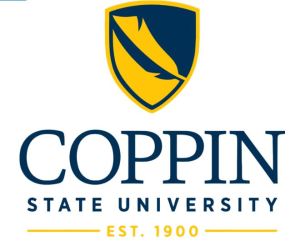

Coppin State University was founded in 1900 to fill the need for education for African Americans. Specifically, Coppin was founded as a school for black educators, who would go on to teach generations of young people in Maryland, and specifically in the Baltimore City Public School System.
The university’s namesake, Fanny Jackson Coppin, was a teacher, principal and missionary, who was born into slavery, and understood the freedom that could be won and opportunities that could be gained from African Americans pursuing their education. Fanny Jackson Coppin was a trailblazer who went on to become the first African American woman to lead an institution of higher learning as head principal for the Institute for Colored Youth.
Over the years, Coppin evolved from a training program to a teacher’s college, and then to an institution that offered Bachelor of Arts, Bachelor of Science, Master’s and Doctoral degrees as it then became Coppin State College and later, Coppin State University. Coppin is an HBCU that has evolved into a four-year public institution serving the needs of a multicultural, multigenerational student body, that provides a quality, affordable education, and continues to develop new and innovative academic programs to cement its status as a leader in urban higher education. The university is staying true to its roots and innovating in the teacher innovation space.

Coppin State University offers a Bachelor of Science in Early Childhood Education Human Development program online, which is targeted toward professionals who work with children from birth to age five and focuses on cultivating cultural competency and responsiveness that will support student development. Coppin’s Master of Education (M.Ed.) in Teacher Leadership provides access to high-quality professional development for teachers with state-licensed licenses, or advanced professional certificates; educators who are pursuing a master’s degree or National Board Certification; as well as lead teachers, and master teachers to enhance teacher effectiveness and improve student learning outcomes in high-need rural and urban communities.
Coppin has also launched the Center for Inclusive Excellence (CIE), which aims to create a national model for inclusivity in the classroom and workplace for teachers. The CIE is supported by a nearly $2 million Center of Educational Excellence for Black Teachers Grant (CEEBT) award from the U.S. Department of Education and oversees Coppin’s $3.7 million grant award for the continuation of the Pathways to Professions (P2P) program. The CIE will introduce stackable credentials that will help realize the goals of the Blueprint for Maryland’s Future, offer teachers advantages of earning one or more post-baccalaureate certificates, and also providing teacher’s with the option of earning an advanced degree with salary incentives and national recognition.
For individuals looking beyond teacher education, Coppin offers a range of new programs, including an online Bachelor of Science in Health Information Management program, post-Baccalaureate Certificate Forensic Rehabilitation Counseling, Certificate in eSports Management, and a nonprofit leadership studies program.
Culture is part of student life and learning at Coppin. While Coppin is a historically black institution, the student body at Coppin includes students from 35 states, the District of Columbia, and 30 international countries. Coppin helps drive the local and state economy, generating a $250 million economic impact for the region. In addition, 70% of Coppin State University graduates remain in Maryland after graduation, and 48% of graduates choose to live in Baltimore City.
Coppin State University is committed as an anchor institution to nurturing potential and transforming lives through education, and creating pathways to economic mobility for all.
The post Coppin State University: Go All In appeared first on AFRO American Newspapers .











